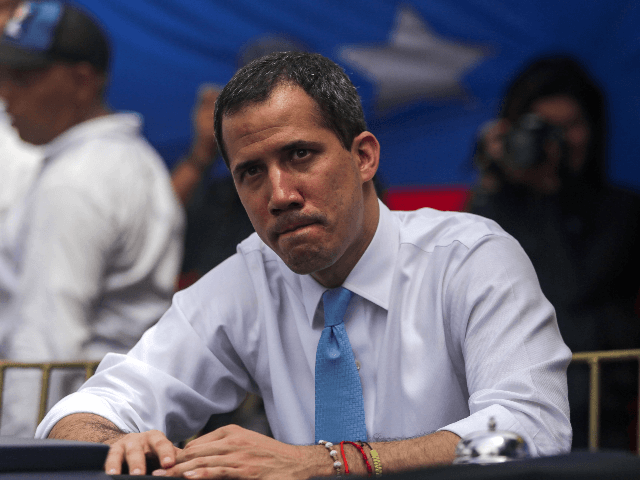A poll published this weekend by the Venezuelan firm Meganálisis revealed that the vast majority of Venezuelans see the government of President Juan Guaidó as “a lie,” despite also overwhelmingly rejecting the illegitimate regime of dictator Nicolás Maduro.
The Megánalisis poll, taken between January 13-25 and published on the 26th, reflects a growing lack of faith that Guaidó will be able to wield any power in the country, a recurring theme in polling since Guaidó legally became president of the country two years ago. The Venezuelan constitution allows the National Assembly, the country’s legislature, to replace the head of the government with an “interim president” in the event that the leader ruptures the democratic order of the country. Following the end of Nicolás Maduro’s last legal term as president in January 2019, Maduro refused to step down, triggering the swearing-in of Guaidó as the legitimate interim president of the country at the time.
Guaidó has failed to use his constitutional legitimacy to convince the nation’s military to follow him, making Maduro the de facto commander-in-chief of the country and preventing Guaidó from wielding any real power. As Guaidó is the nation’s de jure president, however, most of the free world has recognized him as such and welcomed his appointed ambassadors, who represent him abroad.
The United States under President Donald Trump was among the first nations to recognize Guaidó as president. Current President Joe Biden has indicated that he will continue to recognize Guaidó, inviting his ambassador to the United States, Carlos Vecchio, to his inauguration last month.
For months, polling of average Venezuelans indicates that, while Maduro is not legitimately their leader, they reject Guaidó, as well. Like Maduro, Guaidó was a longtime member of a socialist party, Popular Will, and put forth an initiative following his inauguration known as the “Plan País” (“Country Plan”) that emphasizes socialist policies, primarily nationalization of major industries, as a solution to the current woes Venezuelans face. Venezuela has endured two decades of socialist policies that have resulted in a complete collapse of its political structure, healthcare system, power grid, and currency.
Speaking to pollsters last month, 80.3 percent of respondents in Venezuela said they would support Maduro and his socialist party, the United Socialist Party of Venezuela (PSUV), leaving power.
Asked, “is the interim government of Juan Guaidó real and existing, or a lie and non-existent?,” 88.2 percent said the latter. Only a little more than four percent of Venezuelans agreed that Guaidó’s government “exists.” A larger number, 7.6 percent, said they did not know if Guaidó’s government was real or not.
The Meganálisis January poll also asked respondents about their preferences regarding the future of the opposition movement in the country, offering the choices among those who said they support an end to the Maduro regime of “unity” among the opposition or “cleansing the opposition, expelling corrupt people or those who negotiate with chavistas.” 70.8 percent of respondents preferred the latter, and almost twice the number of people answered “don’t know” than in support of “unity.”
“Unity” has been a major message of the Guaidó team, urging support even for those who formerly belonged to the regimes of Maduro or predecessor Hugo Chávez and have since switched sides. Guaidó has stated publicly that he would consider offering even Maduro amnesty for the long list of human rights atrocities he is responsible for. A United Nations human rights mission to the country last year “found reasonable grounds to believe that Venezuelan authorities and security forces have since 2014 planned and executed serious human rights violations, some of which — including arbitrary killings and the systematic use of torture — amount to crimes against humanity.”
Those who oppose Maduro but have publicly criticized Guaidó’s multiple attempts at talks with the regime and proposals of a possible amnesty for human rights crimes have been met with criticism not just from Guaidó’s team, but from supporters abroad. Elliot Abrams, the anti-Trump ideologue Trump appointed to run his Venezuela policy, notably insulted conservative Venezuelan political leader María Corina Machado, one of the few visible women in the anti-Maduro movement, last year for refusing to join a pro-dialogue coalition with Guaidó after what she described as a “frank” conversation with him.
Abrams predicted last month that Biden would do little to change Trump’s policies on Venezuela, arguably the least successful of the Trump era.
“I don’t think we will see major changes in U.S. policy. And I think that they understand that the face of the opposition, the opposition’s leader, is Juan Guaidó,” Abrams told the Miami Herald.
Biden’s invitation of Vecchio, Guaidó’s ambassador, to his inauguration was a clear sign that he would not change policies compared to the Trump administration. Polling since Guaidó took over has consistently shown Venezuelans do not support the United States backing Guaidó and do not think that Washington’s endorsement has made him any more capable of fixing the country. A July 2020 poll by Meganálisis found that 78.8 percent of Venezuelans wanted Trump to actively stop supporting Guaidó. A month later, 82.4 percent of respondents said that they believed that Guaidó had “deceived President Trump” by claiming that the nation’s military supported him.
Follow Frances Martel on Facebook and Twitter.

COMMENTS
Please let us know if you're having issues with commenting.